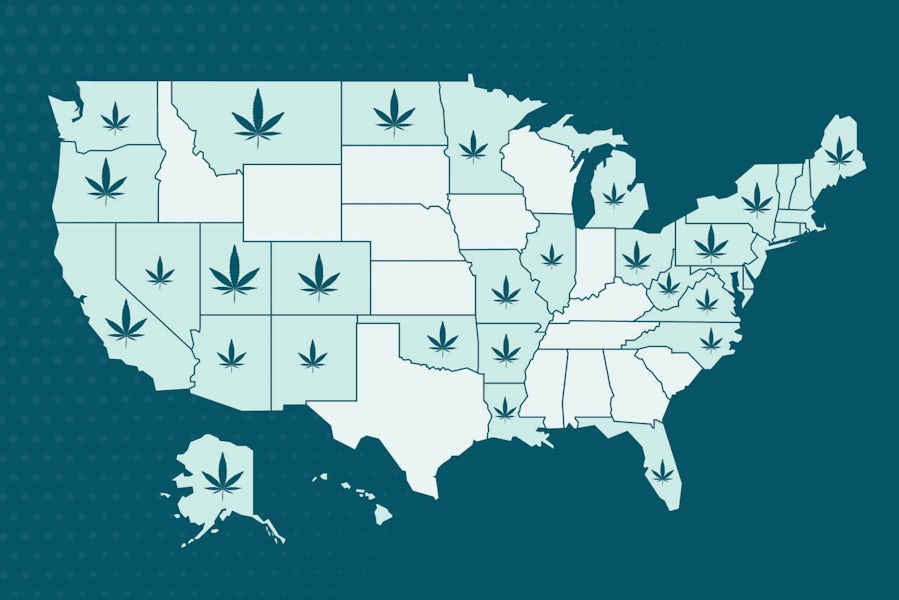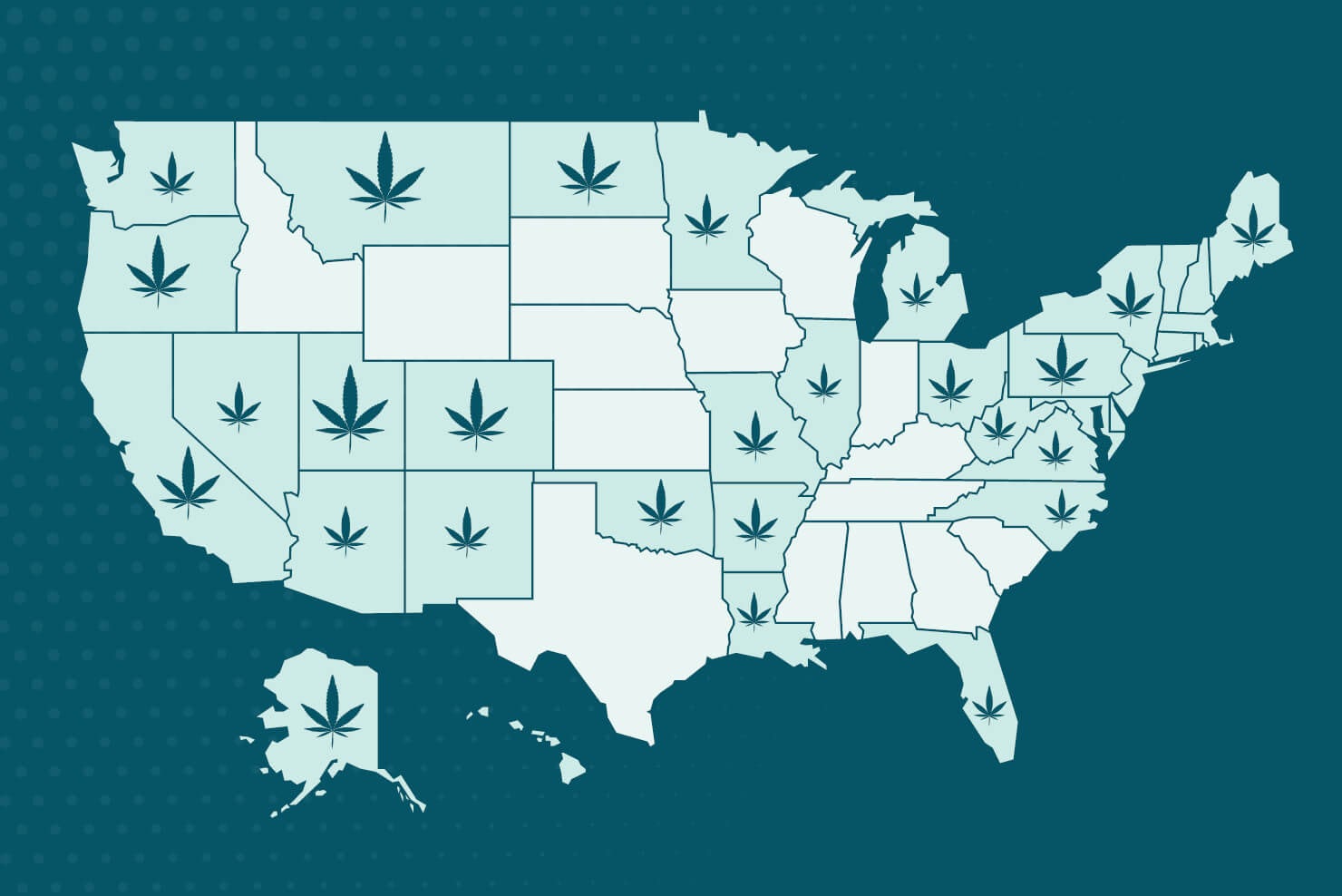Medical: Yes
Recreational: Yes
Reciprocity: No
Recreational cannabis became legal in Connecticut on July 1, 2021. The law, S.B. 1201, allows people over 21 to possess up to 1.5 ounces of cannabis in public and up to 5 ounces at their personal residence. It also allows home cultivation, but only beginning on July 1, 2023, after which adults will be able to grow up to six plants for personal use. Medical patients will be allowed to cultivate up to three mature and three immature plants at their own residence starting October 1, 2021.
The law also considers 1 ounce of cannabis to be equivalent to 5 grams of cannabis concentrate, according to the Marijuana Policy Project.
Legal cannabis retail sales are not expected to begin until 2022, according to New Haven’s News 8.
S.B. 1201 also will enact the expungement of marijuana convictions, and sets up a regulated system for cultivators, manufacturers, and cannabis retail businesses. Under the law, half of the cannabis licenses will be awarded to “social equity applicants,” who come from communities most adversely affected by the Drug War. They will also receive technical assistance, funding, and training to help them enter the industry.
On the criminal justice front, the law also eliminates the smell of cannabis or burnt cannabis and suspicion of cannabis possession as probable cause for a police search, and removes cannabis possession as a reason to revoke parole or probation.
In addition, landlords cannot discriminate against renters based on past cannabis convictions and cannot require them to take a drug test or to abstain from using non-smokable cannabis in the residence.
The law also includes a number of stipulations to prevent discrimination or punishment in the workforce and at institutions of higher education based on cannabis possession (of less than 4 onces) or low-level past convictions.
How to get a medical card in Connecticut
To receive medical marijuana in Connecticut, an applicant must apply online with the Connecticut Department of Administrative Services.
To register, the applicant must be a resident of Connecticut in treatment for a debilitating medical condition by a Connecticut-licensed physician or advanced registered nurse.
The registration fee for the program is $100.
Qualifying conditions
In Connecticut, an applicant may receive medical marijuana if they (or the person they are providing caregiver services for) has one or more of the following conditions:
- Cancer
- Glaucoma
- Positive Status for Human Immunodeficiency Virus or Acquired Immune Deficiency Syndrome
- Parkinson’s Disease
- Multiple Sclerosis
- Chronic pain lasting more than six months
- Damage to the Nervous Tissue of the Spinal Cord with Objective Neurological Indication of Intractable Spasticity
- Epilepsy
- Cachexia
- Wasting Syndrome
- Crohn’s Disease
- Post-Traumatic Stress Disorder
- Sickle Cell Disease
- Post Laminectomy Syndrome with Chronic Radiculopathy
- Severe Psoriasis and Psoriatic Arthritis
- Amyotrophic Lateral Sclerosis
- Ulcerative Colitis
- Complex Regional Pain Syndrome, Type 1 and Type II
- Cerebral Palsy
- Cystic Fibrosis
- Irreversible Spinal Cord Injury with Objective Neurological Indication of Intractable Spasticity
- Terminal Illness Requiring End-Of-Life Care
- Uncontrolled Intractable Seizure Disorder
- Spasticity or Neuropathic Pain Associated with Fibromyalgia
- Severe Rheumatoid Arthritis
- Post Herpetic Neuralgia
- Hydrocephalus with Intractable Headache
- Intractable Headache Syndromes
- Neuropathic Facial Pain
- Muscular Dystrophy
- Osteogenesis Imperfecta
- Chronic Neuropathic Pain Associated with Degenerative Spinal Disorders
- Interstitial Cystitis
- MALS Syndrome (Median Arcuate Ligament Syndrome)
- Vulvodynia and Vulvar Burning
- Intractable Neuropathic Pain that Is Unresponsive to Standard Medical Treatments
- Tourette Syndrome
- Ehlers-Danlos Syndrome
For Patients Under 18, Debilitating Medical Conditions Include:
- Cerebral Palsy
- Cystic Fibrosis
- Irreversible Spinal Cord Injury with Objective Neurological Indication of Intractable Spasticity
- Severe Epilepsy
- Terminal Illness Requiring End-Of-Life Care
- Uncontrolled Intractable Seizure Disorder
- Muscular Dystrophy
- Osteogenesis Imperfecta
- Intractable Neuropathic Pain that Is Unresponsive to Standard Medical Treatments
- Tourette Syndrome for patients who have failed standard medical treatment
Reciprocity
Connecticut does not accept out of state medical marijuana licenses.
Where to Buy
The state’s first dispensary opened in 2014 and there are currently more than a dozen open across the state. At Connecticut dispensaries, patients can purchase flower, pre-rolls, edibles, concentrates, topicals, and accessories.
Taxes and Medical Marijuana in Connecticut
Connecticut imposes a tax of $3.50 per gram (or portion thereof) on marijuana.
Sign up for bi-weekly updates, packed full of cannabis education, recipes, and tips. Your inbox will love it.

 Shop
Shop Support
Support












